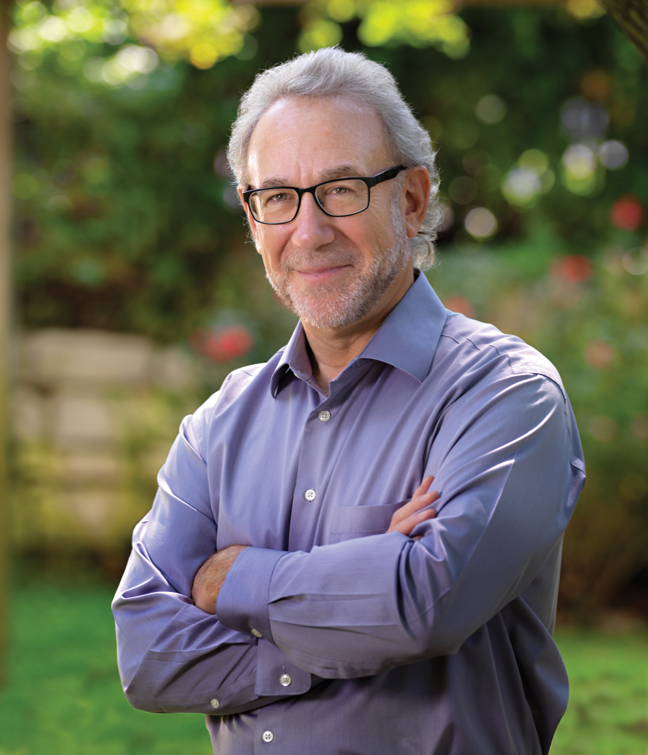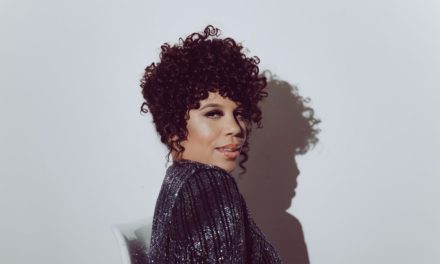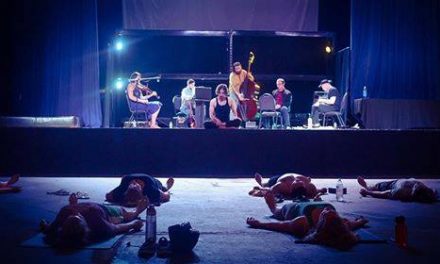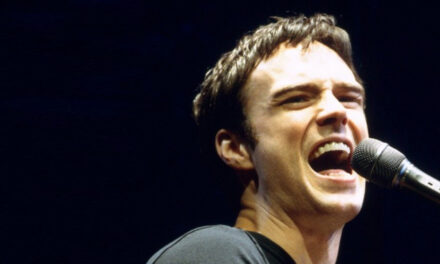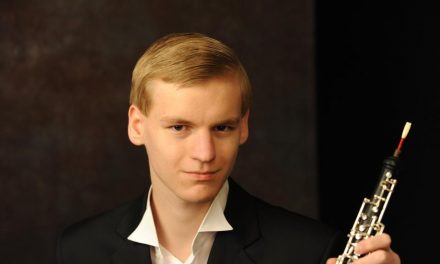Interview with Louisville Orchestra Conductor Bob Bernhardt
By Scott Dowd
Entire contents copyright © 2016 Fearless Designs. All rights reserved.
Bob Bernhardt. Photo by Brad Cansler.
Louisville Orchestra has had its ups and downs over the last thirty-five years. Gradually, the face of the orchestra has been transformed into a lean, dynamic force within our community. Through it all, Bob Bernhardt has remained a constant—entertaining and educating audiences with his particular style of humor. This season he celebrates his thirty-fifth consecutive season with the Louisville Orchestra and, concurrently, his twentieth anniversary as Principal Pops Conductor with a series of concerts he designed to please himself and his loyal audiences.
Scott Dowd: Five years ago you stepped down as Music Director in Chattanooga. Do you get much time now to sit on Signal Mountain and watch birds?
Bob Bernhardt: It was more like walking off a low cliff hoping a net would appear!
SD: Fortunately, it did.
BB: It did, indeed. I’m actually a little bit busier than I was before. Although I’m not a music director with any orchestra, I am now the principal pops conductor with three orchestras!
SD: I know Louisville is one of them, of course, and I assume you’re working with Chattanooga. But what is the third?
BB: Grand Rapids, Michigan. I’m also in my eleventh year of a continuing relationship with Edmonton Symphony. I’m there four or five times a year.
SD: You don’t have to manage anyone, so you are free to just focus on the music?
BB: Pretty much. There are managerial aspects, but it’s mostly about the logistics involved in planning the kind of concerts I want to do. I can also say “No.” Not that I couldn’t before, but I can move toward the happiness and my joy a little bit more freely, and that has been quite wonderful.
SD: As a music director, how much of your life is claimed by the administrative aspects of the job?
BB: I think that is the biggest shock for young people when they become music directors. The actual podium time may only be twenty percent. If you are the music director, the artistic vision of the company is in your hands—the administrative team is yours, auditions are yours, and personnel matters are yours. The modern music director is often deeply involved in development and fundraising. Public relations also take up a lot of time. There are extraordinary people in our business like Teddy Abrams who, with boundless energy, become involved in every one these aspects.
SD: Not just become involved—he has become a true innovator and leader!
BB: I look at his work ethic and the unparalleled diversity and variety of the things he does with awe and admiration.
SD: He has been amazing how he became a part of the community so quickly. You are now working with young conductors who will become the leaders of the future.
BB: Yes, I am an artist-in-residence at Lee University in Chattanooga and I conduct the orchestra there. Being a teacher has its own rewards. I actually have just a few graduate conducting students I work with and a graduate assistant to whom I try to give podium time.
SD: What kind of programming are you introducing? Young orchestral musicians face different expectations than those who came into the industry thirty years ago. Programming is changing significantly.
BB: Well, I’ll tell you something that is quite rare where I am. Paul Conn, Lee University’s president, came to me after my first concert there and asked if it would be of value for the students to play a pops concert. I told him that I thought it would be incredibly valuable. Not all of them, certainly, are going to become professional musicians. But those who are will find it part of their musical lives. So as part of the season, we had one of the touring pops acts with whom I work in my professional life come to the university. The kids got a couple of rehearsals and then were thrown onto the scaffold, as they say.
SD: What did they get from that experience that is different than a performance of standard repertoire?
BB: Learning to accompany these pops artists takes a different skill set and a different kind of listening. There is already an acknowledgement of the broad expectations of the contemporary orchestral player. If you’re playing in the National Symphony now, you will play everything from Mahler to Broadway shows to hip-hop to David Bowie! It’s going to be everything.
SD: It occurs to me that your strength as a pops conductor is probably related to your passion for conducting operas.
BB: It is not necessarily a truism, but I will say that if you can conduct opera, everything else is a little bit easier. There are so many moving parts in an opera that a piece of furniture can ruin your evening. Being in that arena where you have to be constantly alert to the fray, where you are working with great vocal musicians whose instrument may be a little different from night to night, prepares you for just about anything. In grad school, I studied accompanied operatic recitative conducting. I found that with that as a base, accompanying pianists, violinists, whatever it happens to be; it’s all about listening to the breathing. Maybe what opera gives more than anything else is the focus on breath and phrase.
SD: Do you still conduct opera?
BB: I’ve been doing some opera pops. I finished thirty consecutive years of opera here in Chattanooga about five years ago. But next year I have Madame Butterfly in March, complete and fully staged. Whenever I can throw opera into my arena, I do.
SD: This season, in addition to celebrating thirty-five consecutive years with the Louisville Orchestra, you are also marking your twentieth season as Pops conductor. In fact, you have already launched the season. Tell me about that concert.
BB: I was, of course, thrilled to open the season by celebrating the one-hundredth anniversary of Ella Fitzgerald’s birth. We did a wonderful show called Ella & Louie with Byron Stripling, who has performed his Louie Armstrong tribute with me many times in different cities. He is an extraordinary entertainer with an expansive view of music history and one of the great jazz trumpeters. With Marva Hicks, he put together a tribute to Louie Armstrong and Ella Fitzgerald individually and as collaborators. Growing up, I saw a lot of these immortal performers on The Ed Sullivan Show and they had this amazing energy between them that was just beautiful and I was glad to honor. It is incredible music played and sung beautifully. It was a great way to open the season.
SD: What have you planned to celebrate the rest of the season?
BB: They actually gave me November 5th for my 35th/20th Anniversary Concert. They asked me what I wanted to do and I said, “How about the music of John Williams?” Of all the pops concerts I do, the ones I love the most are those that play John’s incredible works. He’s one of my heroes— as you probably know! He has also been somewhat of a mentor. I love the way his music is loved by 8-year-olds, 88-year-olds and everyone in between. I don’t think there are many composers of whom that can be said. I also asked if I could have a chorus, so we’ve lined up the Louisville Youth Choir and the UofL Cardinal Singers led by Dr. Kent E. Hatteberg. The concert will be in three halves, with two intermissions, and the middle half will be John Williams’s choral music.
SD: Which choral works have you chosen?
BB: “Duel of the Fates” from Phantom Menace; “Somewhere In My Memory” from Home Alone; “Dry Your Tears Afrika” from Amistad; and “Call of the Champions,” a fanfare he composed for the 2002 Olympic Games in Salt Lake City. The first and last half of the concert are either written by or arranged by John Williams. I’ve asked our former concertmaster, Michael Davis, who shared the stage with me for over thirty years, to come back as the soloist for three of John’s wonderful works, including Theme from Schindler’s List, “Tango Pour Una Cabeza” (orchestrated for Al Pacino to dance to in Scent of a Woman), and then he’ll play the solo violin part for Fiddler on the Roof—the film adaptation of which earned John Williams his first Academy Award in 1972.
SD: He has plenty of music to choose from. You could do many tribute concerts without having to play the same work twice.
BB: That is very true. But there is one piece on the program he didn’t write. Ten years ago, on my twenty-fifth anniversary with the Orchestra—it doesn’t seem that long ago, does it? —For that concert, I invited one of my closest friends, Douglas Lowry, to write something. He did, but it has had only one public performance. I love the overture and asked the orchestra if they would please allow me the privilege of doing it again and they said, “Great!” Doug was the dean of the Eastman School of Music when he died three years ago. But back in the Jurassic Period, we were two of the four conductors in the graduate class at USC in Los Angeles. We had a forty-year friendship and I wanted to pay tribute to Doug on the concert. It’s called “Mr. Serious Gets His YaYa’s Out”—a very clever, funny piece. I’m looking forward to doing that.
SD: It sounds like a great concert that touches on a number of your career highlights. What have you planned for the rest of the season?
BB: There is a Cirque Musica Holiday Spectacular. I’ve done it three or four times now in other cities and it’s a blast for the audiences and the musicians. The orchestra is on stage playing holiday music and barnburners from the classical repertoire. In front of the orchestra—and sometimes above the orchestra—will be great athletes, jugglers, gymnasts and acrobats. Some of them are circus performers; some are former Olympic athletes with a dazzling combination of physical prowess. And, of course, there will be fantastic music!
SD: What are the logistics of putting something like that on the stage?
BB: Remarkable. The backstage crew is very involved, especially when people are flown above the musicians! Then in January, we are performing The Music of David Bowie, a memorial tribute to David Bowie. There is a huge body of work from which to choose, and gratefully much of it was conceived orchestrally on a grand scale and it fits the symphony beautifully. It’s not really part of the anniversary, but we are bringing the group America in for the pops series and I really love their music: “Horse With No Name,” “Sister Golden Hair Surprise,” “Ventura Highway.” I have worked with these guys many times and they’re two of the nicest people in the business. They sound fantastic and I’m very happy that they are coming back.
SD: What is the last pops concert of the season?
BB: A group called Time for Three. These guys are three of Teddy’s good friends and Teddy is going to conduct this one. I think that’s another sign of the modern relationship with music directors and regional cities. Music directors now are involved in all of the series the orchestra performs. For example, Teddy is conducting some of the neighborhood concerts, most of the subscriptions, educational programs and pops series. When I was principal conductor of the Rochester Symphony, I did that as well and it shows that from top down the orchestra is committed to all of this music and all of these series.
SD: Tell me about Time for Three.
BB: It’s two violins and a bass and they ain’t met music they don’t love! They can play anything from hip-hop to grunge to bluegrass to classical with unbelievable spirit and energy. You kind of have to see them to believe them.
SD: It sounds like a great season and I hope people will come out to be part of it.
BB: For me, this is going to be a joy ride. I say that unabashedly! I’m very grateful and I’m amazed and gratified that my professional life has coincided consistently with the city of Louisville and the Louisville Orchestra—both of which I love so much!
Season tickets for the Pops Series range from $191 to $353 per person. Get yours now by calling Louisville Orchestra at 502.587.8681. To find out about all of Louisville Orchestra’s concerts in the 2016–2017 season and order online, go to louisvilleorchestra.org. Season tickets are also available through The Kentucky Center Box Office, 502.584.7777, or at KentuckyCenter.org.
Scott Dowd has a wealth of experience working within and commenting upon the arts scene in Louisville. He has been involved with Kentucky Opera, the Louisville Orchestra, and Louisville Public Media. His talents and experience include: Actor; Director; Singer; Musician; Radio and Television Interviewer; Classical and News Jock; Public Speaking; Public Relations; Marketing; Development; Writer; Substantive Editor. He currently serves on the Board for Arts-Louisville.com.

